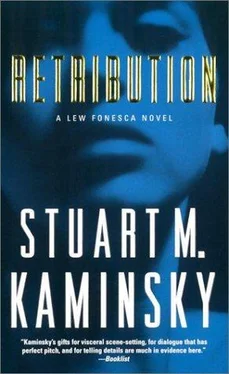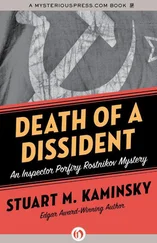Stuart Kaminsky - Retribution
Здесь есть возможность читать онлайн «Stuart Kaminsky - Retribution» весь текст электронной книги совершенно бесплатно (целиком полную версию без сокращений). В некоторых случаях можно слушать аудио, скачать через торрент в формате fb2 и присутствует краткое содержание. Жанр: Криминальный детектив, на английском языке. Описание произведения, (предисловие) а так же отзывы посетителей доступны на портале библиотеки ЛибКат.
- Название:Retribution
- Автор:
- Жанр:
- Год:неизвестен
- ISBN:нет данных
- Рейтинг книги:4 / 5. Голосов: 1
-
Избранное:Добавить в избранное
- Отзывы:
-
Ваша оценка:
- 80
- 1
- 2
- 3
- 4
- 5
Retribution: краткое содержание, описание и аннотация
Предлагаем к чтению аннотацию, описание, краткое содержание или предисловие (зависит от того, что написал сам автор книги «Retribution»). Если вы не нашли необходимую информацию о книге — напишите в комментариях, мы постараемся отыскать её.
Retribution — читать онлайн бесплатно полную книгу (весь текст) целиком
Ниже представлен текст книги, разбитый по страницам. Система сохранения места последней прочитанной страницы, позволяет с удобством читать онлайн бесплатно книгу «Retribution», без необходимости каждый раз заново искать на чём Вы остановились. Поставьте закладку, и сможете в любой момент перейти на страницу, на которой закончили чтение.
Интервал:
Закладка:
“Merrymen?” asked Tim. “Michael Merrymen?”
Jesse and I looked at Tim who smiled and said, “Man’s in the paper almost as much as that doctor who’s always suing the hospital or someone,” said Tim. “Classic paranoid. Sues Albertson’s, Barnes amp; Noble, neighbors, gets himself listed in the crime reports, noise levels, guns. Name it. He’s your man. Even tried to run for City Council a few years ago. Couldn’t come up with even twenty signatures on his petition. My theory, if you ask me, is he saw the light one morning, maybe turned on his television and saw something or found a rattlesnake in his mailbox and realized the world wasn’t a safe place to live in.”
“Everyone’s out to get him,” I said.
“At this point,” said Tim, turning a crinkly page of the paper, “he’s probably right.”
“Adele Hanford,” I tried on Jesse who pursed her lips.
“We hung out a little for a while,” she said, “before I dropped out. She was wild but straightened out. Won some kind of writing prize even. It was in the paper or somewhere.”
“She and Mickey going together?” I asked.
Jesse laughed.
“Anything can happen,” she said as a customer came through the door, a nervous-looking woman in a hospital blue uniform, a cigarette in her hand.
“Anything can happen,” Tim repeated. “Anytime.”
Jesse moved away and I finished my sandwich.
Anything could happen. Anytime. A woman could be driving home from work one night, her husband at home checking on the pasta, and a car the shape and color of grinning death could cut her in half, crumple her into nothingness.
“Anything,” I said, not bothering to finish the last bite of my sandwich. “Anytime.”
“Watch out for yourself,” Tim said as I dropped three dollars on the counter. “Probably doesn’t make any difference but it can’t hurt.”
“You’ve brightened my morning,” I said, getting off of the red-leatherette stool.
“Glad to help,” said Tim.
Ames was waiting for me in front of the Texas Bar and Grille. The temperature had already reached the eighties according to the not-very-bright bantering talk-show abuser out of Tampa who I was listening to on the radio. I can take almost any defect in a car but it has to have a radio. I need voices, sounds. I can deal with thoughts at a second level but I needed noise, voices filling the void of consciousness on the surface. B.J. and M.J. in the morning talking to women who had hit policemen with toilet plungers, Dr. Laura failing to listen to people nearly in tears trying desperately to tell their tales, even the threatening voices of southern-born-again or born-into-it Christian broadcasters telling me what the Scriptures really said. I liked the Sunday morning black Baptist preachers going hoarse with warnings and promises of an afterlife far better than the one Tim from Steubenville read about in the papers.
Ames was wearing a long-sleeved shirt, jeans, and boots. He also wore a thin blue zipper jacket under which, I was sure, rested a weapon of not recent vintage.
He climbed in.
I took Osprey down to Tamiami Trail and turned left when I got the light. Traffic was reasonably heavy for what was now lunch hour for most people.
“We’re going to Osprey,” I said.
Ames nodded.
I explained about Marvin Uliaks, the note left on my door, Conrad Lonsberg’s children in Venice. Ames nodded. I told him what I knew about Bernard Corsello whose body we had found. Ames nodded.
“Adele,” he said.
“Right,” I agreed. “We’re looking for Adele.”
He nodded in agreement. As we passed Sarasota Memorial Hospital, I pushed the AM button on the radio and got WGUL, the oldies station which I knew was Ames’s favorite. We listened to Frankie Laine doing “Ghost Riders in the Sky” as we moved slowly past Southgate Plaza and then crossed Bee Ridge.
“Read some of Lonsberg’s stuff last night,” he said.
“Me too.”
“Rereading, I guess,” he said.
“And?”
We went over the bridge at Phillipi Creek as Johnny Mercer sang “The Waiter and the Porter and the Upstairs Maid.”
“Not my kind of book,” he said. “Pushes the knife too deep. Feels sorry for himself. Least he did.”
I resisted the urge to turn to Ames in astonishment or to say something about this historic moment when Ames Mc-Kinney decided not only to carry on an extended conversation, but to criticize a book. Maybe he was the pod who had replaced Uncle Ira in the old Invasion of the Body Snatchers.
I wondered what Ann Horowitz would say about Conrad Lonsberg feeling sorry for himself. I had come to Ann feeling sorry for losing my wife, my life. She had told me that I was feeling sorry for two things, for the loss of the wife who defined who I was and for myself. Ann had said that both feelings were reasonable and that there was no hurry to get rid of either of them. Was Conrad Lonsberg like that? Or had he been when he was a young man and had written those books that met the feelings of a generation of people who felt they had lost something but were never quite sure what it was? Lonsberg gave them something to feel lost about. Were his missing manuscripts all about learning to live with failure?
In Osprey we turned on Bay Street off of Tamiami Trail at the Exxon station and then turned left at the next corner, Patterson. The house we were looking for was about two blocks down. We couldn’t actually see the house. It was deep behind trees and bushes huddled right up to the paved street that had no sidewalk. The mailbox was black, looked almost freshly polished, and had a red metal flag tucked down to show there was no mail to be picked up. The house number was in clear white letters on the box along with the name “Dorsey.”
I pulled onto the narrow stone driveway between the trees and drove slowly, leaves and branches slapping against the windshield and top of the car suggesting that visitors weren’t frequent.
We came to a clearing after about thirty yards after the assault of the flora. To the left was a blue Ford, vintage 1950 with collector’s license tags. I parked next to it and got out.
We turned to face a man at work and a woman reading. They were in front of a building, or rather a collection of small one-story buildings connected to each other. The oldest-looking building on the right was solid white stone. Attached to it was a wooden section that contrasted with the stone section. A third section attached to the wooden one was made of something that resembled aluminum siding. Together they formed a single structure that looked as if it had been built by a blind man, but the man on his knees, with a brick in his hand as he worked on a fourth unmatched section of red bricks, was clearly not blind. He turned his head to look at us, brick in one hand, a bucket of mortar at his side. He wore paint-splattered painter’s overalls and a baseball cap that looked like vintage Pittsburgh Pirates. He straightened but didn’t get off his knees.
I guessed he was Clark Dorsey. I also guessed that he was around fifty years old. I didn’t have to guess that he wasn’t happy to see us. His face was a dead giveaway.
The woman was sitting in one of those green and white vinyl beach chairs. There was a round white table next to her and a big umbrella sticking out of a hole in the middle of the table to provide her some shade, but she wasn’t taking any chances. She wore a floppy straw hat and sunglasses and I guessed she had a supply of 46 SPF sunscreen nearby.
The woman took off her glasses and examined us as we approached. She was about the same age as the man, lean, hair still dark but showing some gray, few lines, and a wary smile.
“Clark Dorsey?” I asked as we kept moving forward.
The man got up slowly, put the brick on a huge pile of bricks nearby.
Читать дальшеИнтервал:
Закладка:
Похожие книги на «Retribution»
Представляем Вашему вниманию похожие книги на «Retribution» списком для выбора. Мы отобрали схожую по названию и смыслу литературу в надежде предоставить читателям больше вариантов отыскать новые, интересные, ещё непрочитанные произведения.
Обсуждение, отзывы о книге «Retribution» и просто собственные мнения читателей. Оставьте ваши комментарии, напишите, что Вы думаете о произведении, его смысле или главных героях. Укажите что конкретно понравилось, а что нет, и почему Вы так считаете.












